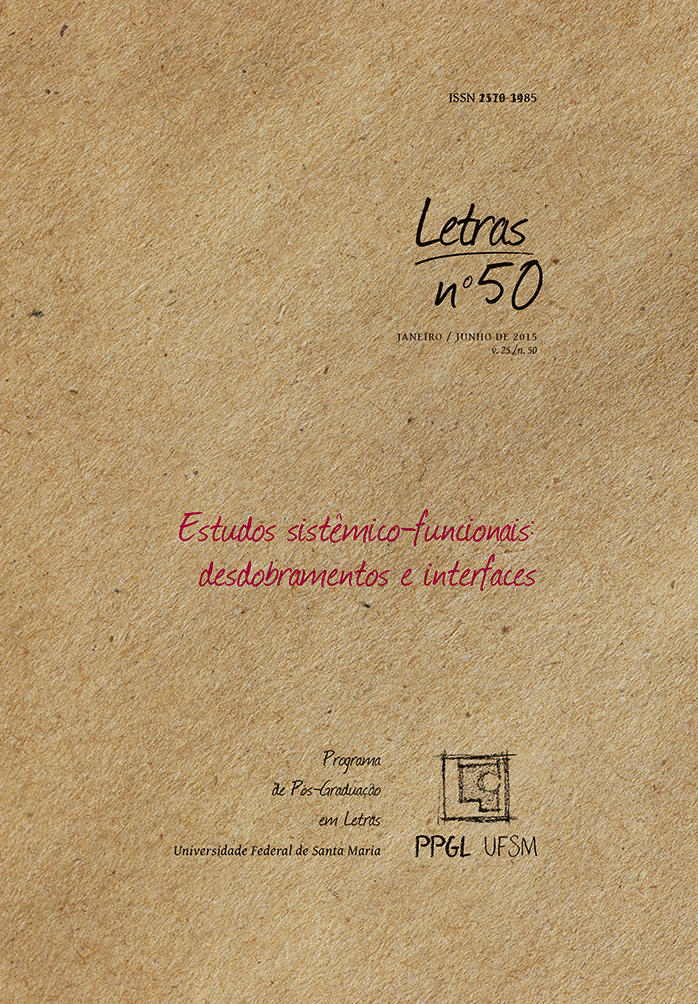Contribuições da linguística sistêmico-funcional (lsf) para o entendimento do texto literário em contexto de formação de tradutores
DOI:
https://doi.org/10.5902/2176148520218Schlagworte:
Tradução literária, Ideologia, Avaliatividade, Formação de tradutoresAbstract
Este capítulo parte da definição de texto como artefato (cultural) para discutir formas de abordagem do texto literário em contexto de tradução. Depreende-se dessa discussão que as relações entre o texto original e sua retextualização para uma línguaalvo, no par linguístico inglês-português, não são diretas, mas, ao contrário, saturadas de ideologias. As perguntas que orientaram a escrita deste capítulo foram: O que deve ser levado em conta no texto literário no momento de sua tradução? Como traduzi-lo de modo a apreender todas as relações que a trama faz com a realidade (ficcional) de seus personagens, em contextos sociais às vezes tão adversos, quando comparados com o contexto da cultura receptora? As discussões conduzem para o reconhecimento da problemática instaurada no ato de traduzir, sobretudo quando se utiliza o arcabouço teóricometodológico da Avaliatividade (Appraisal) para o entendimento dessa problemática.Downloads
Literaturhinweise
HALLIDAY, M. A. K. An introduction to Functional Grammar. 2nd. ed. London: Edward Arnold, 1994.
HALLIDAY, M. A. K.; MATTHIESSEN, C. M. I. M. An introduction to Functional Grammar. 3rd. ed. London: Edward Arnold, 2004.
MARTIN, J. R. Beyond exchange: appraisal systems in English. In: HUNSTON, S.; THOMPSON, G. (org.). Evaluation in text: authorial stance and the construction of discourse. Oxford: Oxford University Press, 1999, p. 142-175.
MARTIN, J. R.; ROSE, D. Working with discourse: meaning beyond the clause. 2nd. ed. London; New York: Continuum, 2007.
MARTIN, J. R.; ROSE, D. Genre relations: mapping culture. London: Oakville, 2008.
MARTIN, J. R.; WHITE, P. R. R. The language of evaluation: appraisal in English. New York; UK: Palgrave, 2005.
MUNDAY, J. Style and ideology in translation: Latin American writing in English. London; New York: Routledge, 2008.
MUNDAY, J. Evaluation in Translation: critical points of translator decision-making. London; New York: Routledge, 2012.
PEDEN, M. S. A conversation on translation with Margareth Sayers Peden. In: BALDERSTON, D.; SCHWARTZ, M. (org.). Voice-overs: translation and Latin American literature. New York: SUNY, 2002, p. 142-156.
PURCHASE, S. Key concepts in Victorian literature. New York; UK: Palgrave, 2006.
RIO, J. Nota do tradutor. In: WILDE, O. O Retrato de Dorian Gray. Trad. João do Rio. São Paulo: Hedra, 2009, p. 27-28.
RODRIGUES-JÚNIOR, A. S.; BARBARA, L. Linguistic constructions of appraisal in the novel The Picture of Dorian Gray and its Brazilian translation and adaptations: an exploratory analysis. Revista Brasileira de Linguística Aplicada, v. 13, n. 1, p. 229-255, 2013.
SIMPSON, P. Language, ideology, and point of view. London; New York: Routledge, 1993.
WILDE, O. The picture of Dorian Gray. England; USA: Penguin, 2003. [originalmente publicada em 1890 e revisada em 1891].
WILDE, O. O retrato de Dorian Gray. Trad. João do Rio. São Paulo: Hedra, 2009 [originalmente traduzida em 1919].
WILDE, O. O retrato de Dorian Gray. Trad. Adap. Clarice Lispector. Rio de Janeiro: Ediouro, 2006. [originalmente traduzida em 1974].
WILDE, O. O retrato de Dorian Gray. Trad. Adap. Cláudia Lopes. São Paulo: Scipione, 1997.
YALLOP, C. The construction of equivalence. In: STEINER, E.; YALLOP, C. (org.). Exploring translation and multilingual text production: beyond content. Berlin; New York: Mouton de Gruyter, 2001, p. 229-246.







